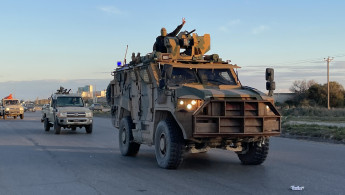Libyan armed convoy turns back from Tripoli after clashes feared
An armed convoy affiliated with Libya's parliament-backed prime minister moved towards Tripoli on Thursday before turning back as he seeks a way to take office in the capital despite the incumbent refusing to cede power.
The parliament swore in Fathi Bashagha as prime minister a week ago and he said on Tuesday he would arrive in Tripoli within two days, promising to take over the government there peacefully.
However, an attempt to install Bashagha in the capital could ignite fighting between armed factions that support him, and others that back the incumbent Abdulhamid al-Dbeibah, who says he will only leave office after an election.
The military convoy of parallel prime minister of Fathi Bashagha is locked up in rural areas outside Tripoli, still finding no way to get in due to armed opposition pic.twitter.com/DnqXrbvEV8
— The Libya Observer (@Lyobserver) March 10, 2022
Military sources said the convoy set out from Misrata but was unable to find a route into Tripoli without meeting opposition from factions that back Dbeibah.
Bashagha's office said the convoy was "a security force" not seeking a war, and that it had returned to its previous base in response to demands from international and regional friends.
A Reuters witness just outside Tripoli on the main coastal highway heading towards Misrata said there were military vehicles and fighters stationed in places along the road, but traffic was moving normally and there was no sign of clashes.
The U.S. ambassador to Libya Richard Norland tweeted that he had spoken to Bashagha and "commended him on his willingness to de-escalate tensions today and seek to resolve the current political disagreement through negotiations, not force".
The U.N. Libya mission had voiced concern at what it called "reports about the mobilisation of forces and movement of large convoys of armed groups that have increased tensions in and around Tripoli".
Libya has enjoyed a rare period of comparative calm since the collapse of a 14-month assault on Tripoli in summer 2020 by eastern forces in the civil war, leading to a peace process backed by the United Nations.
That process included the creation of Dbeibah's interim government with a mandate to unify state institutions that had been divided for years between rival governments in east and west, and to oversee the run-up to national elections.
However, the election process collapsed in December shortly before the scheduled vote and rival factions have argued over the right path forward.
The parliament, which mostly took the eastern side during the civil war, declared Dbeibah's government had expired and announced a new transitional period under Bashagha's new government and no elections until next year.
Dbeibah has announced plans to hold an election in the summer.





 Follow the Middle East's top stories in English at The New Arab on Google News
Follow the Middle East's top stories in English at The New Arab on Google News
![Netanyahu furiously denounced the ICC [Getty]](/sites/default/files/styles/image_330x185/public/2024-11/GettyImages-2169352575.jpg?h=199d8c1f&itok=-vRiruf5)
![Both Hamas and the Palestinian Authority welcomed the ICC arrest warrants [Getty]](/sites/default/files/styles/image_330x185/public/2024-11/GettyImages-2178351173.jpg?h=199d8c1f&itok=TV858iVg)
